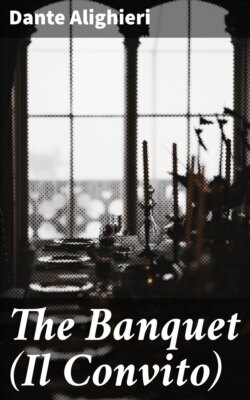Читать книгу The Banquet (Il Convito) - Dante Alighieri - Страница 16
На сайте Литреса книга снята с продажи.
CHAPTER X.
ОглавлениеTable of Contents
He greatly needs excuse who, at a feast so noble in its provisions, and so honourable in its guests, sets bread of barley, not of wheaten flour: and evident must be the reason which can make a man depart from that which has long been the custom of others, as the use of Latin in writing a Commentary. And, therefore, he would make the reason evident; for the end of new things is not certain, because experience of them has never been had before: hence, the ways used and observed are estimated both in process and in the end.
Reason, therefore, is moved to command that man should diligently look about him when he enters a new path, saying, "that, in deliberating about new things, that reason must be clear which can make a man depart from an old custom." Let no one marvel, then, if the digression touching my apology be long; but, as is necessary, let him bear its length with patience.
Continuing it, I say that, since it has been shown how, in order to avoid unsuitable confusion and from readiness of liberality, I fixed on the Commentary in the Mother Tongue and left the Latin, the order of the entire apology requires that I now prove how I attached myself to that through the natural love for my native tongue, which is the third and last reason which moved me to this. I say that natural love moves the lover principally to three things: the one is to exalt the loved object, the second is to be jealous thereof, the third is to defend it, as each one sees constantly to happen; and these three things made me adopt it, that is, our Mother Tongue, which naturally and accidentally I love and have loved.
I was moved in the first place to exalt it. And that I do exalt it may be seen by this reason: it happens that it is possible to magnify things in many conditions of greatness, and nothing makes so great as the greatness of that goodness which is the mother and preserver of all other forms of greatness. And no greater goodness can a man have than that of virtuous action, which is his own goodness, by which the greatness of true dignity and of true honour, of true power, of true riches, of true friends, of true and pure renown, are acquired and preserved: and this greatness I give to this friend, inasmuch as that which he had of goodness in latent power and hidden, I cause him to have in action and revealed in its own operation, which is to declare thought.
Secondly, I was moved by jealousy of it. The jealousy of the friend makes a man anxious to secure lasting provision; wherefore, thinking that, from the desire to understand these Songs, some unlearned man would have translated the Latin Commentary into the Mother Tongue; and fearing that the Mother Tongue might have been employed by some one who would have made it seem ugly, as he did who translated the Latin of the "Ethics," I endeavoured to employ it, trusting in myself more than in any other. Again, I was moved to defend it from its numerous accusers, who depreciate it and commend others, especially the Langue d'Oc, saying, that the latter is more beautiful and better than this, therein deviating from the truth. For by this Commentary the great excellence of our common Lingua di Si will appear, since through it, most lofty and most original ideas may be as fitly, sufficiently, and easily expressed as if it were by the Latin itself, which cannot show its virtue in things rhymed because of accidental ornaments which are connected therewith—that is, the rhyme and the rhythm, or the regulated measure; as it is with the beauty of a lady when the splendour of the jewels and of the garments excite more admiration than she herself. He, therefore, who wishes to judge well of a lady looks at her when she is alone and her natural beauty is with her, free from all accidental ornament. So it will be with this Commentary, in which will be seen the facility of the syllables, the propriety of the conditions, and the sweet orations which are made in our Mother Tongue, which a good observer will perceive to be full of most sweet and most amiable beauty. But, since it is most determined in its intention to show the error and the malice of the accuser, I will tell, to the confusion of those who accuse the Italian language, wherefore they are moved to do this; and this I shall do in a special chapter, in order that their shame may be more notable.
